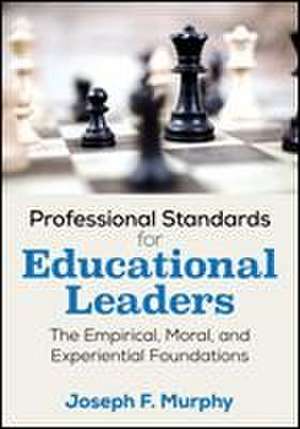Professional Standards for Educational Leaders: The Empirical, Moral, and Experiential Foundations
Autor Joseph F. Murphyen Limba Engleză Paperback – 27 mar 2017
Written for higher education faculty, professional development providers, and school and district leaders, this comprehensive manual will power the educational leadership profession through the challenges of the next decade and beyond.
Preț: 311.06 lei
Nou
59.53€ • 61.99$ • 50.31£
Carte disponibilă
Livrare economică 17 februarie-03 martie
Livrare express 31 ianuarie-06 februarie pentru 45.11 lei
Specificații
ISBN-10: 1506337481
Pagini: 360
Dimensiuni: 178 x 254 x 24 mm
Greutate: 0.68 kg
Ediția:1
Editura: SAGE Publications
Colecția Corwin
Locul publicării:Thousand Oaks, United States
Recenzii
"The effectiveness of the new Professional Standards for Educational Leaders depends upon both their quality and their ability to be used to frame educational leader practices and the policies that inform their work. This book provides an excellent foundation to understand their nature and to promote their active use in leader practice and policy. The book lays out a clear, current empirical and intellectual foundation, while strengthening the field’s commitment to its moral purposes of leading schools of care and effective learning for all children."
"This book is a thorough exposition of foundational evidence and argument for effective educational leadership. It establishes a well-supported rationale for the new Professional Educational Leadership Standards 2015 and goes further to help readers clearly understand the elements of educational organization and practice—key foci of leadership work—most conducive to student success. Particularly important is the way that this book integrates the essential elements of ethics and equity. When we are tempted to reduce educational leadership to a set of technical elements, this book rightly reminds us that it is a deeply moral and human enterprise."
"Joseph Murphy debunks myths about standards for educational leaders and skillfully unpacks the moral, foundational, and experiential basis for the revised professional standards to guide effective leadership of our nation’s schools. He does a masterful job of depicting how the ten standards reflect academic press and caring support and are driven by mission, vision, and core values; ethics and professional norms; equity and cultural responsiveness; and school improvement. This book is a must read for those interested in leadership for learning and the academic success and wellbeing of students, because these standards will shape our field for the next quarter century as the ISLLC standards have done since 1996."
Cuprins
Introduction
1. Mission, Vision, and Core Values
2. Ethics and Professional Norms
3. Equity and Cultural Responsiveness
4. Engaged Teaching
5. Constructed Learning
6. Curriculum and Assessment
7. Community of Care and Support for Students
8. Instructional Capacity of School Personnel
9. Professional Community for Teachers and Staff
10. Meaningful Engagement of Families and Community
11. Operations: Staffing, Time, and Material Resources
12. School Improvement
References
Index
Notă biografică
Joseph F. Murphy is the Frank W. Mayborn Chair and associate dean at Peabody College of Education at Vanderbilt University. He has also been a faculty member at the University of Illinois and The Ohio State University, where he was the William Ray Flesher Professor of Education.
In the public schools, he has served as an administrator at the school, district, and state levels, including an appointment as the executive assistant to the chief deputy superintendent of public instruction in California. His most recent appointment was as the founding president of the Ohio Principals Leadership Academy. At the university level, he has served as department chair and associate dean.
He is past vice president of the American Educational Research Association and was the founding chair of the Interstate School Leaders Licensure Consortium (ISLLC). He is co-editor of the AERA Handbook on Educational Administration (1999) and editor of the National Society for the Study of Education (NSSE) yearbook, The Educational Leadership Challenge (2002).
His work is in the area of school improvement, with special emphasis on leadership and policy. He has authored or co-authored 18 books in this area and edited another 12. His most recent authored volumes include Understanding and Assessing the Charter School Movement (2002), Leadership for Literacy: Research-Based Practice, PreK-3 (2003), Connecting Teacher Leadership and School Improvement (2005), Preparing School Leaders: Defining a Research and Action Agenda (2006), and Turning Around Failing Schools: Lessons From the Organizational Sciences.
